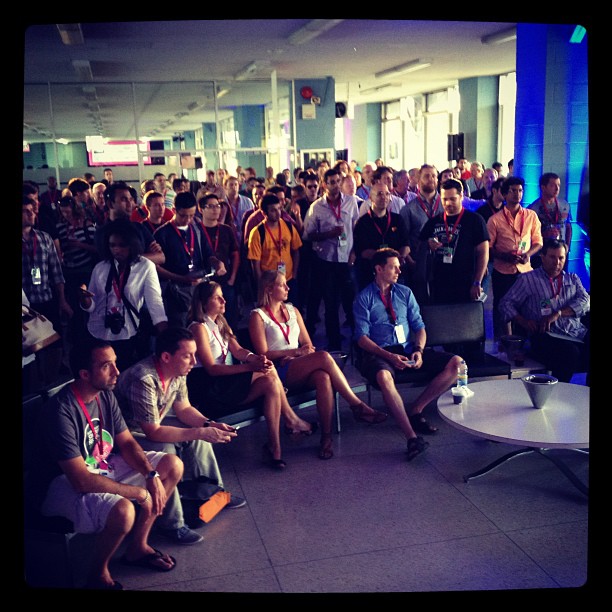Editor’s note: This is a guest post by serial entrepreneur and marketing executive April Dunford who is currently the head of Enterprise Market Strategy for Huawei. April specializes in brining new products to market including messaging, positioning, market strategy, go-to-market planning and lead generation. She is one of the leading B2B/enterprise marketers in the world and we’re really lucky to be able to share here content with you. Follow her on Twitter or RocketWatcher.com. This post was originally published in August 31, 2012 on RocketWatcher.com.
I spent the day yesterday at FounderFuel for their Mentor Day. If you aren’t familiar with FounderFuel they are a very successful startup accelerator based in Montreal. And what a day it was – 8 startups pitched and then did roundtable breakout sessions with over 50 mentors including VC’s, angel investors, entrepreneurs and senior executives. Here’s my mentor’s perspective on how a startup can really get the most out of a day like that:
1/ Pick your Target Mentors Ahead of Time: 50 mentors is a lot and they represented a wide cross section of folks that have deep experience in different consumer and business markets, and have a range of skills from technical expertise to sales, marketing, finance, and legal experience. Selecting a subset of the mentors with experience relevant to your business will help you target your discussions.A handful of the teams that needed marketing help reached out to me by email before the day and that helped to make sure that we connected at the session which I thought was pretty smart.
 2/ Ask for Feedback on your Pitch: The mentors are both experienced pitch artists, and listen to pitches a lot. What better folks to give feedback on what worked and what didn’t work with the pitch you just gave? In this case the companies are all still in the early stages of the accelerator program so it’s a great time to get feedback that will improve the ultimate pitch you give on demo day. The feedback will also give you a feel for the differences in what an Angel investor might be looking for over what the more traditional VC’s are looking for in a pitch. “Tell me one thing that would have made my pitch better” or “What was missing from my pitch?” would both be great ways to start that discussion.
2/ Ask for Feedback on your Pitch: The mentors are both experienced pitch artists, and listen to pitches a lot. What better folks to give feedback on what worked and what didn’t work with the pitch you just gave? In this case the companies are all still in the early stages of the accelerator program so it’s a great time to get feedback that will improve the ultimate pitch you give on demo day. The feedback will also give you a feel for the differences in what an Angel investor might be looking for over what the more traditional VC’s are looking for in a pitch. “Tell me one thing that would have made my pitch better” or “What was missing from my pitch?” would both be great ways to start that discussion.
3/ Ask for Specific Help: The mentors are ready and willing to help but they can’t guess what you need. Coming with a set of specific requests helps shape the discussion in a way that is most helpful to you. Don’t be afraid to ask for specific introductions – even if the folks in the room don’t have the answers you need, chances are they know someone who does.
4/ Listen, Ask Questions (and Filter later): – The mentors yesterday came from really different backgrounds and had worked in a broad range of industries (consumer, gaming, retail, enterprise, financial services). Sure we’re all smart folks but you wouldn’t believe how different our opinons were about questions the startups were asking. For example, at my session with Openera – a tool for automatically organizing files and attachments – we got into a discussion about selling to consumers versus enterprises as a starting point. I ALWAYS tilt toward enterprises when people ask me that because I know/love enterprise sales. The mentor beside me, Yona Shtern, the CEO from Beyond the Rack on the other hand thought selling B2C (or B2C2B) was just fine. Only Openera can decide who’s got smarter advice for their business (yeah OK, in this case it’s probably the smarty-pants Beyond the Rack guy but hey you get what I’m trying to say here). Another example – in the discussion with InfoActive (a very cool tool that lets you easily create beautiful interactive data visualizations), I immediately saw the applicability to creating interactive marketing materials. I’m a marketer, that’s the obvious use case for someone like me. The mentor beside me (James Duncan, CTO at Inktank) on the other hand saw the value in selling to IT departments that needed a way to easily create good looking dashboards to help IT communicate to the business side of the house. That’s a great use case that a marketing person like me would be unlikely to immediately think of. Both ideas might be worth investigating but only InfoActive can really decide that. Avoiding “mentor whiplash”, as the FounderFuel gang refers to it, is a critical skill for startups in accelerators that have deep rosters of active mentors. Remember too that time is limited so you don’t want to waste it having a long debate with a single mentor over a specific point. Listen, probe a bit if you need to, and then move on. You can always schedule follow-on time with a specific mentor to explore an idea later.
5/ Take Notes: You put a couple of CEO’s a VC, a senior exec and a CTO at a table together and guess what happens? We talk. A lot. Not only that but the conversation moves very quickly from one point of view to the next. Some teams were recording the sessions but the room was loud (did I mention we talk a lot?) and figuring out who said what later might be a challenge by voice alone. Having someone taking notes is a good idea to make sure that you’re capturing ideas as they are flowing.
6/ Work the Edge Time: By far the best way to get 1 on 1 time with a mentor yesterday was to do it over the break or over lunch. That also gives the mentor a chance to ask questions they might not get a chance to in a round table session.
7/ Don’t Forget Everyone’s a Potential Investor : The VC’s are easy to spot (and there were a lot of them there) but most of the mentors I talked to are also doing a bit of angel investing as well. For companies at this stage anyone that’s willing to invest time with your company might also be likely to invest cash as well.
So there’s my advice. I’m sure the other mentors all have different opinions – yep, we’re funny that way.
![]() Dulcie Madden
Dulcie Madden![]() Joe Chernov
Joe Chernov![]() Fred Destin
Fred Destin![]() Jen van der Meer
Jen van der Meer![]() Michael Baum
Michael Baum![]()
![]() Some rights reserved by Michael Lewkowitz
Some rights reserved by Michael Lewkowitz



